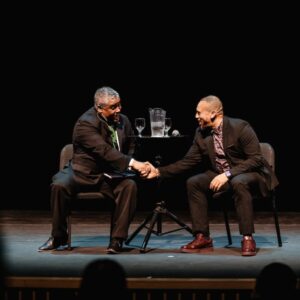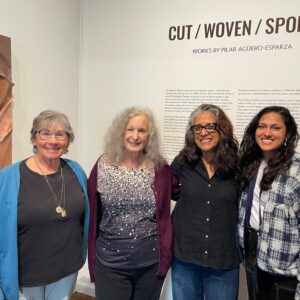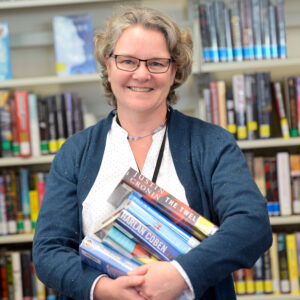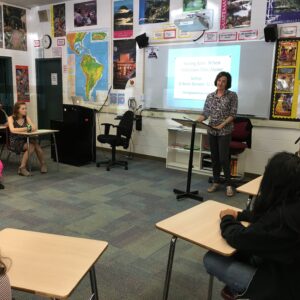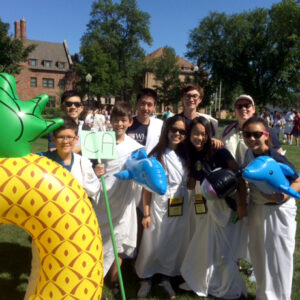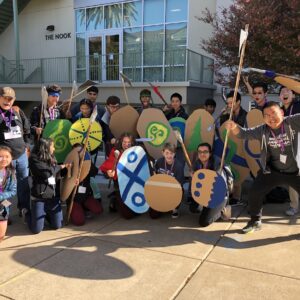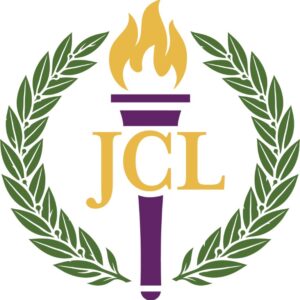This article originally appeared in the summer 2011 Harker Quarterly.
Reading is like getting all the vitamins you need from a chocolate sundae – it feels good going down and it’s good for you, too.
According to the National Endowment for the Arts, high frequency adult readers are more than twice as likely to participate in charity work, three times as likely to attend performing arts events, one-and-a-half times more likely to attend or participate in a sporting event. (NEA 2002)
Reading, specifically reading for pleasure – a habit that includes the freedom to choose what to read – needs to be encouraged in childhood to flourish in adulthood. Not surprisingly, it’s a focus of a myriad of programs at Harker targeted at all ages, from the youngest kindergartners through senior faculty.
At the lower school, such programs include an annual book fair, the Halloween Haunted House Reading Contest and weekly library visits for K-4 students where librarians Kathy Clark and Enid Davis introduce lifelong fictional friends. Library clerk Moureen Lennon perpetuates the enthusiasm with book talks and checkout time in grade 5 English classes.
“Reading is like any skill: it has to be practiced to reach mastery. Being a master reader brings a lifetime of joy and knowledge,” says lower school librarian, former library director and folklorist Davis. Davis has made good on her promise for the last 15 years through the annual Ogre Awards – a yearlong revel in folklore study for second graders that culminates in an Academy Award-like celebration of witches, tricksters and giants. Nostalgic seniors are oft heard recalling their roles in the Ogre Awards a decade earlier.
Once bitten, students tend to experience long-lasting effects from the book-bug. “I like to read because it gives me a chance to escape reality,” says Nikhil Manglik, grade 6. “I can cast a spell with Harry Potter, solve a crime with the Hardy Boys, jump into Greek mythology with Percy Jackson, or anything else!”
Little wonder then, that a habit that fosters such good feelings also precipitates good grades. According to a 2004 study, students “who read more than just assigned materials show increased vocabulary skills, improved test performance (and) higher levels of general knowledge.” (Hatfield) A decade earlier, researchers determined that “leisure reading … has been positively related to psychological absorption and tolerance of complexity.” (Mill & Kuiken)
Such evidence is strong support for middle school librarian Bernie Morrissey’s take on reading. “Pleasure reading helps young people become better students by increasing their verbal abilities. Instead of spending school breaks with SAT vocabulary books, students should check out lots of library books to read for fun.”
To encourage leisure reading, Morrissey sponsors a self-directed book club for students in grades 6-8. Participants collectively decide on a novel, read it and enjoy a discussion over snacks.
Demanding schedules and homework loads foiled a similar design at the upper school. In response, upper school librarians created the Non Required Reading Reading Club (NRRRC). Twice a month students gather to chat about whatever book they’ve read recently or to get a list of suggestions. Nerk, as it’s fondly called, “celebrates reading without adding an extra obligation to already busy students,” reports upper school librarian Meredith Cranston. “We enjoy enthusiastic conversation about books, author readings and upcoming publications over lunch. It’s fabulous!”
Three Nerk members have spun their love of reading into national publication. Denzil Sikka ’09, Nikita Agrawal ’10 and Christina Li, grade 12, have had multiple reviews
of young adult fiction printed in “Voice of Youth Advocates,” a leading review source for librarians serving teens. On a college acceptance letter, a handwritten note encouraged Sikka to “come write book reviews at Cal Tech!”
Summer provides a spot on the calendar to which all three Harker libraries anchor their leisure reading programs. The lower school publishes an annual summer reading list of age-appropriate authors. Students in K-5 who read five or more titles earn a library pin to wear on their dress uniforms.
The middle school summer reading program, Reading Roundtable, features small group book discussions based on collectively chosen titles and takes place in student advisories the first week of school.
Itching to talk about summer reads, upper school students get a chance to chat books the first week of school, too. Every spring teachers and administrators sponsor a title or genre, and students select from among all offerings. This year’s list features 53 unique choices ranging from Steve Berry’s “The Last Emperor” (sponsored by history teacher Ramsay Westgate) to “Slow Death by Rubber Duck: How the Toxic Chemistry of Everyday Life Affects Our Health” by Rick Smith and Bruce Lourie (sponsored by chemistry teacher Robbie Korin) to the very popular mystery genre groups.
As in past years, ReCreate Reading 2011 will host an author as well. Pulitzer prize-winning journalist and author of “Acceptance,” David L. Marcus will engage a large group of students via Skype and recount the experience of seven Long Island teens’ quest for college. Previous years’ ReCreate Reading programs have featured Dave Cullen, author of “Columbine,” and Matt Richtel, author of “Hooked.”
The success of such programs depends upon allowing students freedom of choice. “When you’re doing something you like, it always makes things so much easier,” says Mercedes Chien, grade 9, who points out, “A great book is one that makes me want to keep reading.”
Teachers – just like students – step up to summer reading every year. Facilitated by Jennifer Gargano, assistant head of school for academic affairs, the popular faculty reading program allows Harker teachers to opt in to a discussion over an intriguing professional title. This summer’s read: “The Edutainer: Connecting the Art and Science of Teaching” by Brad Johnson and Tammy Maxson.
Not to be left out of the frenzy, members of the class of 2011 shared their all-time favorites by creating a Senior Book Legacy. This year’s Legacies – annotated book recommendations – are featured on a wall-size, Facebook-like display of titles in Manzanita Hall.
Like readers everywhere, Harker bibliophiles tend to get a little evangelistic about reading. Consequently several programs feature Harker students providing books for children who would not otherwise enjoy them. The Pajama Project, an annual grade 3 service event, brings in donations of pajamas and bedtime books. The drive culminates in a schoolwide pajama day in which a Harker administrator reads – wearing jammies, of course – to the student body.
At the upper school, members of the Global Outreach and Empowerment (GEO) club collected funds to build two libraries in Africa through the Reach Out and Read program.
“Reading,” says Sue Smith, library director, “is a win-win. It’s fun and it makes us better.” And it goes well with ice cream.



